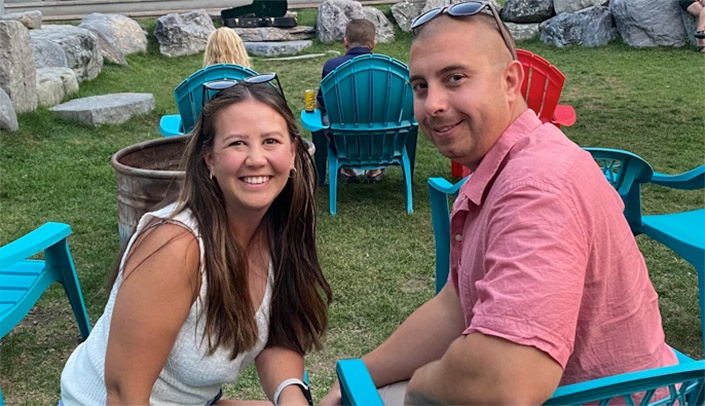October is Pregnancy and Infant Loss Awareness Month, a loss one in four women experience. As part of Nebraska Medicine and UNMC’s Wellness series, Rachael Schmidt, DNP, a nurse practitioner at the Fred & Pamela Buffett Cancer Center, shares her wellness journey.
In July 2020, I had a miscarriage at nine weeks with my first pregnancy — just two weeks after seeing the heartbeat on an ultrasound. This also was in the midst of a pandemic, and I was alone.
I was in shock, and I didn’t know how to react to the news. I left the clinic that day and walked back to my desk as if I were going to resume my normal workday. I hadn’t told anyone at work that I was pregnant and didn’t know how I could tell them I had just miscarried. But as soon as I saw my coworker, I broke down. We briefly talked about what had just happened, and she offered to cover clinic for me the rest of the week, which allowed me to go home to grieve for the next few days.
Looking back, I am so thankful I was able to confide in my colleague, as I’m sure many women may not have the support that I did, allowing me to leave work. I wish I would have told her about my pregnancy sooner, as I had done with my family and close friends. I always knew that if something were to happen, I’d want and need support, not silence. But I hadn’t realized I’d need it from my work family, as well.
 |
| Rachel and Blake with their pets |
More than 80% of miscarriages happen before the second trimester, and most women wait to announce their pregnancy until the 12th or 13th week – because they’ve been told by society it’s better safe than sorry. This way, if your good news becomes bad news, then you won’t have to share your bad news.
But what does that mean? Better to keep your pregnancy a secret for three months, then become isolated, withdrawn and alone if you miscarry?
To be clear, it’s completely understandable if you’d like to keep news of your pregnancy to yourself for however long and for whatever reason. Miscarriages are undoubtedly hard, and, for some women, they can be difficult to discuss. But it’s worth reflecting on whether you’re consciously choosing not to share the details of your personal medical history or reflexively avoiding these conversations because it’s so ingrained in us not to talk about loss and grief. And the grief is undeniable when it comes to miscarriage.
When I was pregnant, it was always more than simply whatever week gestation I was currently at. At six weeks, eight weeks, nine weeks, I already had created an entire life for our child in my mind. I knew the due date. I’d started considering nursery decorations. We had chosen a daycare and names. We’d started thinking what school district they would be in. I wasn’t just grieving a pregnancy but an entire expected future.
Recently, more and more celebrities have come out and talked about their experience. While on the surface this may not seem like huge news to the rest of the world, it can be incredibly helpful to those not in the public eye who have gone through similar experiences. These stories bring visibility and normalize conversations.
|
I wasn’t just grieving a pregnancy but an entire expected future. Rachael Schmidt, DNP |
We’ve all heard the phrase, "You’re not alone." Even though a pregnancy loss can feel isolating, when you hear someone speak about their loss, it reminds you that you truly aren’t alone. Their experience may be similar to your own, or maybe they articulate something in a way you couldn’t. I’ve found so much comfort talking about my experience with others, and it reminds you something that felt so isolating is, unfortunately, a loss others have endured.
I am happy to announce I’m nine weeks pregnant after our third IUI. But the hard reality is that it’s hard to feel confidence or joy, because we are worried this pregnancy may suffer the same fate as the last one. That’s the cruel thing about a pregnancy loss. You feel like you can’t relax or get enthusiastic about anything, as it may be taken away from you in a moment. So, I have things that I constantly work on to manage the high-highs of being pregnant again along with the low-lows of my loss.
Some advice that has helped me:
- Allow yourself to grieve. The emotional impact usually takes longer to heal than physical recovery does. Allowing yourself to grieve the loss can help you come to accept it over time
- Talking about it helps. Whether it was with family, friends, colleagues, or a professional, the more people that knew, the more support I had
- It’s okay to get help. As a provider, I recommend counseling and antidepressant medications to so many patients and have normalized this conversation in my practice. But when it came to getting help myself, it took a lot longer for me to realize that it was okay. Losing a baby is hard and grief is hard to manage. I didn’t realize how much counseling and medication could help me get through this situation
I hope sharing my story about miscarriage helps break the stigma that contributes to an atmosphere of silence and invisibility.
You are not to blame, and you don’t need to go through this alone.

Thank you for sharing your story and normalizing this conversation!
Thank you for sharing your story with us, Rachael!
Congratulations Rachael! Thank you for sharing your story.
I appreciate you sharing your story and wish you the best of luck with this pregnancy!
Thank you for sharing. It is a very difficult event to experience. Good luck with your current pregnancy! Maybe a follow up in August?! 🙂
Thank you for sharing your story and encouraging conversation on this important topic. Best wishes for your pregnancy!
Thanks for helping to bring this topic to the greater conversation. I know so many people who have suffered a loss of pregnancy and felt so devastatingly alone. People don't know how to respond. Your story helps us learn to talk about a difficult situation. Thank you for sharing and best wishes on the future.
Thank you for sharing your story.
I am sorry for your loss Rachael — thank you for bravely sharing your story and normalizing the conversation for our colleagues, physicians, students, and staff.
Thank you for sharing your impactful and beautifully told story of parenting and loss. I agree that support is so essential no matter the timing of the miscarriage. Wishing you well in your current pregnancy.
Such a powerful message and great insight into a difficult and lonely time for a mama and husband! Praying for a healthy baby for you and Blake!
Thank you for sharing. The hardest part about a miscarriage is trying not blame yourself.